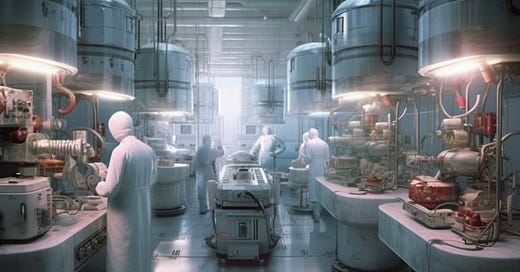Democratizing Innovation: AI's Role in Breaking Barriers for Young Entrepreneurs in Biotechnology
How AI is changing research and development in biotech and pharma, and how new tools lower the barrier to entry and increase the chances of success for young bio-entrepreneurs
Today, we have a guest post from
who will share with us how AI is changing research and development in biotech, and how new AI-powered tools are lowering the barriers to entry for bio-entrepreneurs and increasing their chances for success.Leonardo is an economist, data scientist, and writer with expertise in Artificial Intelligence and the fourth industrial revolution. As a bio-entrepreneur and founder of a think tank, he has worked with Latin American governments and mentored startups across various industries. Leonardo shares his views in
- his weekly newsletter I recommend checking out.It is an understatement to claim that we are entering a new era of technological development thanks to AI. The capacity of LLMs and so many other AI tools are assisting people with day-to-day tasks, but probably its essential, and more profound impact will be at the edge of innovation and research. Even though we might be a few years from the BIG payout of AI-supported R&D in different industries, biotech and pharma might be giving us a preview of things to come.
It is also fascinating seeing the current state of affairs in biotech and the penetration that AI has had in the past couple of years and just looking forward to what future developments will come down the pipeline of incredible tools that will help researchers and entrepreneurs in the coming years. Also on a more personal note, it is fascinating (and kinda frustrating) comparing the powerful tools entrepreneurs have access to today with what we had when I started my own biotech startup back in 2014.
The current state of affairs of the industry with AI
Artificial Intelligence is a vital tool in the biotech and pharma industries. During my time building and developing our startup, we weren’t even close to using many of these tools or they were years away to be usable and affordable for a small biotech startup such as us. But now many tools are available for different researchers and entrepreneurs from the get-go to assist them not only on the more mundane and business-centric side of the equation but also on the core activity of research and development as well.
Currently, AI is being used in a widespread area of fields, and things will only go upward from here. The cost-effectiveness of AI in most areas of intelligence and knowledge makes it an invaluable tool. A tool that is now used as the catalyst helping scientists and researchers accelerate their work, reduce costs, and overall improve the entire pipeline of R&D. One of the ways it does this is by accelerating drug discovery.
One of the key areas that AI is working on at the moment and that could come and bring about many exciting solutions are in silico models where an AI tool can predict how different compounds would interact with themselves or in certain scenarios. This can significantly reduce the time and the costs associated with traditional trial-and-error methods of R&D for new compounds which can be used in pharma and many other healthcare applications.
Here is a brief explanation video of how these “in-silico” developments work:
Another often overlooked part of biotech and pharma development that is being heavily impacted and elevated by AI is Supply Chain Optimization. All the logistics and back office related to the required supplies for the whole chain from lab to market is a key part of the business though sometimes it is wrongfully said to be not as sexy as drug discovery. For some people that might be true, but not for me. The capacity of having AI systems that can analyse and predict issues in the supply chain can help streamline manufacturing and ensure that products are delivered efficiently and at optimal costs. Specially for example with thermodependant compounds that require specific temperatures to maintain their effectiveness while storing, such as the huge logistic challenge that was the COVID vaccine.
So as we can see it is a whole new world with incredible and powerful tools that will no doubt be used in great ways by smarter and more tech-savvy entrepreneurs in the near future which will create synergies and accelerate the different parts of the processes required for building a robust startup as well as reducing costs and accelerating the entire process of R&D.
How is AI changing things?
Now, an area that is still probably too early in the pipeline for big claims or developments just yet that will undoubtedly be affected and enhanced by AI (hopefully us humans too) is Personalized medicine. This is a paradigm shift from traditional medicine where treatments and therapies are a “one size fits all”(usually) drug that is developed and then given to the masses and we kinda adjust the side effects depending on the population and the results of the clinical trials. But the possibility of a compound interacting in a different way with each individual exists because our composition, our hormones and our health is different so of course the interactions of our unique biological systems with drugs and therapies will also differ.
Hopefully, most of the time the difference will be barely noticeable and harmless. But instead of trying to reduce harm to as many people as we can, what if we could identify and isolate how each patient’s system functions and deliver a custom-made drug/therapy just for that person that will minimize even more any potential negative side effects and maximize the benefits of a pharma compound or other solutions for biological troubles. That is the promise of personalized medicine and AI could be the catalyst to make this a reality in the near future where we can extract and analyze the genetic makeup of each individual and develop tailored solutions in a timely manner.
Another area that is rapidly advancing is that of Virtual Clinical Trials, where participants in a clinical trial of new compounds can, thanks to more and easier measurements as well as communication tools, help certain drug treatments to have a larger number of participants in the clinical trials without needing a central location, only a good supply chain to distribute the compounds. The measurements can be done automatically so the participants of the clinical trial could be from anywhere in the world, broadening the horizons of clinical trials and reducing potential unintended consequences due to a lack of diversity in the clinical trials.
Finally, I think the end goal of all of this would be a full-blown automated drug discovery process. Right now it is more of a Collaborative Research Platform where both humans and AI-driven platforms will collaborate generally in teams distributed across the globe, breaking down barriers and accelerating innovation, which is great.
Compared to the closest thing we had in our days were synthetic biology and bioinformatic services that were rudimentary compared to what we can access today. Also, most of those services were prohibitively expensive for a small startup surviving on small government grants. We were lucky the company we hired had a huge scandal where their CEO was associated with an American startup that had a small brush with the law, so they had bigger fish to fry than us.
Mixing both what I’ve learned and what things are happening, how I would recommend people to work and develop
The future of the industry calls for a diverse skill set. One of the things that integrating AI more and more into biotech and research will allow is the democratization of much of the research process. Currently, due to the capital and infrastructure requirements for new developments in biotech and pharma, it is needed large quantities of available resources and human capital. But with good enough AI tools, it reduces the cost of development drastically which would reduce the barriers to entry into the industry. This could lead to novel drug developments and discoveries taking advantage of a multicultural and multidisciplinary approach to R&D. Also it can mean the reduction of barriers to entry for young entrepreneurs to get into biotechnology by leveraging their skills, knowledge, and capital using AI tools that would accelerate their productivity and reduce the costs of development, testing and maybe also the regulatory pathways for approval of these new discoveries.
This leads us to a point that I think could be a big bottleneck for the industry's overall regulatory institutions (the big scary ghost floating over the heads of all researchers). Because if this helps and accelerates the development of new drugs or biotech products and services, the FDA and the EMA and similar institutions will need to modernize and adapt to the coming tsunami of potential applicants with new drug patents under their arms and ready to jump into the market with eagerness.
A glimpse of things to come and forecasting
If things continue to progress and advance at the current speed I think the great aphorism of Marc Andreessen will become a reality and software will eat the world. Maybe not in the way some people claim it will be but it is happening and it will only continue to accelerate. But the fact is that software (especially AI tools) will become the great technological springboard from which so many different areas of humanity’s technological progress and innovation will make their great leap forward, and many things will kick into high gear, accelerating the pace of technological development almost in any other field where researchers and scientists start leveraging their skills and knowledge alongside AI.
Another bold statement, of course, as this leveraging will be more and more powerful and impactful, the more AI moves forward and improves upon itself, the more companies will start to develop a whole slew of different solutions for specialized industries such as the examples we’ve seen so far. And who knows, if the productivity of researchers is advancing, why not imagine a not-so-distant future where we might have fully automated AI-based researchers doing the job at incredible speeds and needing a fraction of the resources and time required for humans to develop innovative solutions?
Now, that might be a leap that will take us some more time than other ones, but no doubt eventually we might see this happening on a smaller or larger scale than we are currently visualizing this. This puts forward a lot of questions about ownership, ethics, and other important issues we need to be discussing. Will people be willing to consume a drug developed fully by an AI with clinical trials only done in simulated test subjects? Or will enforcing institutions and agencies around the world convene that drug development can be automated but trial and safety testing need to happen in volunteering and willing humans? Maybe a fully automated pipeline will emerge or maybe a mixed system might be the best of both worlds, the future is ripe with opportunities for experimentation and learning.
Conclusions
The industry must now focus on fostering collaboration, ethical consideration, and adaptability. It's a thrilling time to be involved in biotech, and the future promises even more extraordinary breakthroughs. The keys to success lie in our ability to combine our unique experiences, learn from our struggles, and forge new paths at the crossroads of technology and biology.
My fun incursion in the world of biotechnology was anything but smooth. The idea of using probiotics to cure lactose intolerance was both ambitious and fraught with technical challenges. Most of them could have been overcome by a lot of the tools showcased here and it is my hope that entrepreneurs in biotech and other industries are able to use these tools as much as possible to maximize and increase their chances of success.
The future looks promising in the fields of biotech and pharma (as well as in other industries). This is one of the most interesting and probably easiest times to go out there and develop a world-changing solution. You just need to muster up the courage, and the determination to push through the adversities that will come in your path. But thanks to these and other tools now is the easiest time to solve global problems and be able to create a long-lasting impact in this world.
H+ Weekly sheds light on the bleeding edge of technology and how advancements in AI, robotics, and biotech can usher in abundance, expand humanity's horizons, and redefine what it means to be human.
A big thank you to my paid subscribers, to my Patrons: whmr, Florian, dux, Eric, Preppikoma and Andrew, and to everyone who bought me a coffee on Ko-Fi. Thank you for the support!








